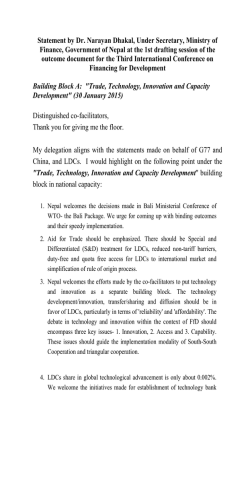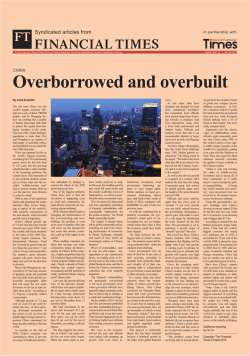
p28-29_Layout 1
MONDAY, FEBRUARY 2, 2015 H E A LT H & S C I E N C E Cold-stunned turtles rehabilitated in New Orleans, released GRAND ISLE, Louisiana: Nearly two dozen turtles that were stranded by cold weather last year in Massachusetts have successfully undergone rehab and have been returned to waters off Louisiana’s coast. More than 1,200 young, “coldstunned” Kemp’s ridley sea turtles were stranded in November and December. According to the National Oceanic and Atmospheric Administration, “cold-stunning” occurs when the circulatory systems of sea turtles exposed to frigid water temperatures for several days slow down to a point where the turtles cannot function. Various sea-turtle rehabilitation facilities along the east and Gulf coasts joined in the effort to care for the stunned turtles. Suzanne Smith, stranding-and-rescue coordinator for the Audubon Nature Institute for Marine Mammals and Sea Turtles, said 21 of the 27 turtles she and her colleagues received were released into the Gulf of Mexico, 24 miles (38 kilometers) off the coast of Grand Isle, on Thursday. “It was a beautiful day,” she said. “We couldn’t have asked for a more beautiful day.” The turtles were placed in open produce boxes and carefully transported for about 100 miles from the institute’s GRAND ISLE, Louisiana: Suzanne Smith, Stranding & Rescue Coordinator of Marine Mammals & Sea Turtles for the Audubon Nature Institute, releases an endangered Kemp’s ridley sea turtle, which was rescued in New England, and rehabilitated by the institute, into the Gulf of Mexico, 24 miles off the coast of Louisiana, yesterday. (Right) The endangered Kemp’s ridley sea turtle, swims away as it is released into the Gulf of Mexico.— AP photos aquatic center before being loaded onto the back of two boats, one provided by Audubon and the other by the state Department of Wildlife and Fisheries. Carefully shielded from the sun, they were then transported out to sea, where the boats’ engines were shut off to ensure the turtles’ safe re-entry into the wild. Each turtle was released by hand on a cloudless, sunny day with temperatures in the low 70s and calm seas - a sharp contrast to the conditions that existed when they were stranded in New England. The turtles immediately swam from the boats, disappearing into the sun-warmed water as Smith and Audubon Nature Institute veterinarian Dr Tres Clarke exchanged a triumphant high-five. One of the 27 turtles the Audubon institute received did not sur- vive, Smith said. The other five, which had suffered from pneumonia or problems with their shells and flippers, will remain in the rescuers’ care for about a month to receive antibiotics and nutrition. “Their prognosis, though, is good,” she said. —AP Black breast-feeding gatherings battle troubling health gaps ‘In the African-American community, we don’t see breast-feeding publicly’ GERMANY: Little Siberian tiger Dragan makes its way through the snow in its enclosure at the zoo in Eberswalde, eastern Germany, on January 31, 2015. Dragan was born on October 7, 2014 and belongs to the most endangered species of the amur tigers. — AFP ‘Tiger heavyweight’ Nepal hosts anti-poaching summit KATHMANDU: Nepal’s success in turning tiger-fearing villagers into their protectors has seen none of the endangered cats killed for almost three years, offering key lessons for an anti-poaching summit opening in Kathmandu yesterday. Experts from conservation group WWF, which is co-hosting the conference with Nepal’s government, said the Himalayan nation was a “tiger heavyweight” in the battle to fight poaching and protect them from extinction. “Nepal and India are our tiger heavyweights leading the region. India excels at recovering tiger numbers and Nepal at zero poaching,” said Mike Baltzer of WWF Tigers Alive Initiative. India in January reported a 30 percent jump in tiger numbers since 2010, while Nepal saw numbers rise almost two thirds between 2009 and 2013. Its last reported poaching incident was in March 2012. Decades of trafficking and habitat destruction have slashed the global tiger population from 100,000 a century ago to approximately 3,000, according to the International Union for the Conservation of Nature. Tikaram Adhikari, director general of Nepal’s department of national parks and wildlife conservation, said an initiative to convince villagers to inform on poachers and pay them half of tourism revenues had paid huge dividends. “Earlier, some villagers even protected poachers because they didn’t want tigers attacking them. We heard them out, built electric fences, focused on increasing tourism and gave them a big cut of the revenues,” Adhikari said. “Now they know the benefits of protecting tigers and they want to help. The survival of the animal is a matter of prestige for them,” he told AFP. Hundreds of young volunteers act as unofficial guards for Nepal’s national parks, home to 198 tigers and 534 rhinos-both listed as critically endangered species by WWF. A tipoff by local villagers meant police were able to arrest four poachers less than a week after they allegedly killed a tiger in 2012, Adhikari said. Nepal has twice been recognized for going a full year with no poaching incidents involving tigers or rhinos. The impoverished country’s success in combating wildlife crime sends a clear signal that “anti-poaching cannot be left only to conservationists,” WWF Nepal’s Diwakar Chapagain said. “We have to involve people on the ground-volunteers and local law enforcement must have a stake in the process. Otherwise conservation is not sustainable,” Chapagain told AFP. —AFP Ebola-hit Liberia delays school reopening MONROVIA: Liberia’s education ministry said yesterday it had postponed by two weeks the reopening of the country’s schools, which were closed six months ago to limit the spread of the Ebola virus. Classes had been set to resume yesterday, but the ministry said in a statement parents and students needed more time to prepare for the new school year. “Classes will start on Monday, February 16, 2015,” the statement said. Liberia is one of three West African countries hit by the deadliest Ebola outbreak on record, together with Guinea and Sierra Leone. Schools in all three countries were closed last year over the outbreak, which has killed around 9,000 people. The rate of new infections has slowed significantly in recent weeks, paving the way for a gradual return to normal. In Guinea, children returned to school on January 19. Sierra Leone has said it will restart classes in March. Liberia’s President Ellen Johnson Sirleaf this week cited cost as a factor hampering the resumption of classes in her country. “The cost of opening shools, as proposed by public, private schools and higher education institutions, is simply prohibitive,” she told parliament. The education ministry said it was working to ensure that Ebola-related “safety protocols, logistics” and “health and training requirements” were in place before classes resumed. —AFP MILWAUKEE: Once a month, baby-toting young women gather in a YMCA conference room to share tips, talk about and demonstrate breast-feeding - an age-old yet sometimes shunned practice in their community. It’s part of a grassroots movement that breast-feeding advocates think just might yield profound benefits - potentially helping diminish health gaps facing black Americans, from higher rates of infant mortality and childhood obesity, to more breast cancer deaths and heart disease in adults. Breast-feeding is thought to help protect against these ills - and it’s much less common among US black women than in whites and others. Rates have improved in recent years but the disparity remains. “In the African-American community, we don’t see breast-feeding publicly - our sisters and aunts aren’t breast-feeding in the living room, they’re not talking about it in the kitchen. It’s different in the Caucasian community,” said Dalvery Blackwell, a lactation consultant-educator and co-founder of the Milwaukee-based African American Breastfeeding Network. The networks’ gatherings aim to change that. Similar groups meet in Detroit, Atlanta and other cities, organized by black women, for black women. While promoting breastfeeding, they acknowledge obstacles that are more prevalent in black communities - absent partners, employers who discourage workplace nursing and flex time for new moms, hospitals that feed newborns formula. The gatherings encourage new mothers to breast-feed for as long as possible; the American Academy of Pediatrics recommends doing it for at least a year. Just over 60 percent of US black mothers have tried breast-feeding but only 16 percent continue for a full year, federal data show. By comparison, more than 80 percent of Hispanics and whites have tried it and at least 25 percent do it for a year. ‘I learn so much’ A government report last year cited the breastfeeding network among efforts to improve rates. Dr Myrtis Sullivan, a black pediatrician and former maternal and child health director for Illinois, said this type of community gathering can be particularly effective. “The synergy that goes on when women interact with other women that are similar to them both culturally and socioeconomically ... seems to be very supportive for breast-feeding,” Sullivan said. At a recent Milwaukee gathering, mothers nursed and shared a meal provided by a University of Wisconsin public health partnership program. Blackwell offered tips about the best breast-feeding diet, how to hold a nursing baby, and signs that a baby is hungry. Retail worker Leslie Curtis, 22, has breast-fed her 6-month-old son, Jace, since his birth. She said the meetings have helped her stick with it. “I learn so much,” she said. “I learn how to properly latch, properly pump, all the nutrition he’s getting, I learn a lot and I love it.” Most of her friends think breastfeeding is too time-consuming, or too painful, and Curtis said her baby’s father “doesn’t understand the whole breast-feeding thing so I don’t even try to explain it.” But Curtis is determined to keep it up for their son’s sake. “Just coming to this group tells me why it’s important,” she said. “It’s really healthy, I know what he’s drinking and he’s eating, compared to formula.” In Detroit, educator Kiddada Green runs the Black Mothers Breastfeeding Club as a modern day old front porch, a place to encourage breast-feeding while building sisterhood. The club meets in women’s homes, drawing a mix of working women and stay-at-home moms. “We work with many women who have never seen a woman breast-feed,” Green said. “We’re making it visible.” “Although you’re getting medical benefits, you’re also getting connections and relationships and bonds that are also healthy for women,” she said. Breast-feeding’s benefits include fewer infant infections and reduced risks for infant mortality, asthma, type 2 diabetes and obesity which all disproportionately affect black children. Effects on moms’ long-term health are less studied but breast-feeding has been linked with lower breast and ovarian cancer rates, while emerging ers’ babies, Blackwell said. Kimarie Bugg, a nurse and founder of the Atlanta-based Reaching Our Sisters Everywhere, said many doctors never discuss breastfeeding with black patients “because they just assume they’re not going to do it - they don’t even mention it.” No one thinks that breast-feeding is a magic panacea and scientific evidence is mixed on some of its purported advantages. But few experts dispute that breast milk is the best nourishment for infants, with potential lifelong benefits. “We know there are significant underlying conditions that lead to poor health outcomes - socioeco- MILWAUKEE : Volunteer Monet Williams, center, holds a friend’s baby whose mother is participating in a monthly gathering that promotes breast-feeding, as she talks to another volunteer at a YMCA. — AP photos MILWAUKEE: Dalvery Blackwell, co-founder of the African American Breastfeeding Network, talks with young mothers as she holds a baby from an attendee. research suggests women who breast-feed may have less heart disease later in life. Reasons why some blacks shun breast-feeding vary but slavery’s legacy is often cited among them. Breast-feeding was common in Africa but became a stigma when women were separated from their own children and forced to breast-feed slave-own- nomic disparities, racism - all play a part,” said Laurence Grummer-Strawn, a longtime breast-feeding advocate and former chief of the Centers for Disease Control and Prevention’s nutrition branch. Lack of breast-feeding contributes and improving rates could help reduce disparities, although by how much is uncertain, he said. — AP White House: Science indicates parents should vaccinate kids WASHINGTON: Amid the measles outbreak stemming from California, the White House is telling parents that science indicates they should vaccinate their children. President Barack Obama’s spokesman, Josh Earnest, said Friday that decisions about vaccinations should be left to parents, but the science on vaccinations “is really clear.” Some parents continue to believe debunked research linking vaccines to autism and refuse vaccinate their children. “I’m not going stand up here and dispense medical advice,” Earnest said when asked whether the president supports parents who choose not to vaccinate. “But I am going to suggest that the president’s view is that people should evaluate this for themselves, with a bias toward good science and toward the advice of our public health professionals, who are trained to offer us exactly this kind of advice.” About 100 cases of the measles have been reported in the US since last month in the second-biggest outbreak in at least 15 years. Most have been traced directly or indirectly to Disneyland in Southern California. The Centers for Disease Control and Prevention says measles-mumps-rubella vaccine is 97 percent effective at preventing measles. The American Academy of Pediatrics says doctors should bring up the importance of vaccinations during visits but should respect a parent’s wishes unless there’s a significant risk to the child. — AP MILWAUKEE: A doll used for breast-feeding training sits on a table with literature during a monthly gathering that promotes breastfeeding at a YMCA. MILWAUKEE: Irena Bottoms feeds her baby as mothers and supportive family members attend a monthly gathering.
© Copyright 2026



